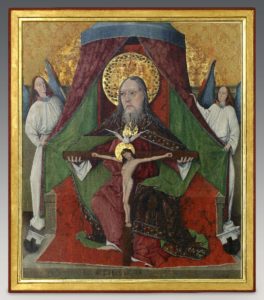Thoughts on Sunday’s Lessons for June 16, 2019
First Reading: Proverbs 8:1-4, 22-31
On the first Sunday after Pentecost we celebrate Trinity Sunday, honoring the theology that came about as the early church sought to understand how Creator, Son, and Holy Spirit can come together as three persons within a single God.

Holy Trinity (1471), gilded tempera painting by an unknown artist who signed the painting “GH.” Originally the central panel on the high altar of Trinity Church in Mosóc, Slovakia. Now in the Hungarian National Gallery, Budapest. (Click image to enlarge.)
Our first reading from Proverbs gives us a poetic description of God’s divine wisdom personified as a woman. At the moment of creation, as told in Genesis, we see God as Creator, Word and Spirit wind moving over the waters to separate light from darkness and earth from sea. Now in Proverbs we hear another way to visualize the Spirit: God called Wisdom, a powerful, creative woman, to be present at the moment of creation. She cries out joy in the newly made world, delighting in humanity.
Psalm: Psalm 8
The 150 ancient hymns in the book of Psalms serve many purposes, from expressions of sadness and lamentation to prayers for help to songs of praise and joy. Sunday’s Psalm is all about praise. We lift our voices in joyful appreciation to the God who created this beautiful world and everything that lives on it. God gave us mastery over all creation, we sing, but we are firmly called to be responsible for God’s creation, not just to take pleasure in it.
Alternate to the Psalm: Canticle 13
In place of a Psalm this week we may sing Canticle 13 from the Book of Common Prayer, “A Song of Praise.” It is a litany of praise and exaltation to God as Creator and King. Remember the story of the three young men who danced and sang in defiance of the flames in King Nebuchadnezzar’s fiery furnace? Protected by God, as told in Daniel and the apocryphal Song of Azariah, they walked unharmed through the fire, singing a hymn of praise to God and all creation. We sing their full song as Canticle 12. These final verses in Canticle 13, added to the young men’s song in modern times, conclude the song with resounding praise to the Trinity: Father, Son, and Holy Spirit.
Second Reading: Romans 5:1-5
This short passage calls for thoughtful reading, as it is important to understand that Paul is not telling us that suffering is good. Nor is he warning that God makes us suffer. Quite the contrary: Writing to an early Christian community in Rome (a mixed group of Jewish Christians and pagan converts, some of whom have known persecution and exile), he points out that we rejoice in God’s grace in spite of suffering. Most important, he says, God’s love through Jesus, poured into us through the Holy Spirit, gives us the strength to stand up to suffering.
Gospel: John 16:12-15
Our Gospel for Trinity Sunday is the last of five consecutive readings from John’s account of Jesus’s conversation with the disciples at the Last Supper. Jesus reminds them that there are things about God that they just can’t understand, that they are not ready to hear. But he also assures them that the Holy Spirit, the spirit of truth, will come to guide them, bearing the glory of Creator and Son.
